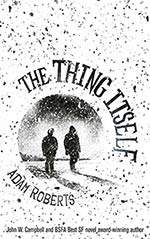
![]() Grayman14
Grayman14
1/27/2018
![]()
The Thing Itself is a science fiction thriller about two men working for SETI on an Antarctic research base in the 1980s. It tells the fascinating story of what happens to them one long south-polar night, and the repercussions of this event. It does this through the intertextual lens of Immanuel Kant's 'Critique of Pure Reason', the Fermi Paradox, a dash of James Joyce, some H.G. Wells, a sliver of John Carpenter, and more. (A lot more references than I was able to pick out on a first reading.)
There are seven separate narratives that comprise this story, with the focus being on Charles Gardner's tale of something unexplainable taking place at the polar research station thirty years ago. It begins when Charles's companion, Roy Curtius, claims to have solved the Fermi Paradox. We follow Charles' story as he attempts to make sense of what happened back then, while the shadows from his past begin to resurface in the present.
'What had happened to me in Antarctica was, I told myself, only hallucination. But it was a horribly vivid hallucination, and it kept returning to me,' (p.49)
Like a number of Adam Roberts's protagonists, Charles is not what you'd call a typical hero. He is a flawed leading character who will very likely leave some readers cold. Some of his actions are questionable to say the least, and his personality doesn't do him many favours. Yet I think he feels more realistic for his flaws. Plus, Roberts writes him so well that I found myself rooting for Charles after a while and laughing out loud at some of the situations he stumbles into.
The Thing Itself raises questions about reality, perception, sentience and what could be behind it all. Artificial intelligence is a major theme in the book, as is Kant's philosophical work the 'Critique of Pure Reason'. I am not going to pretend I understand what Kant was writing about, but this didn't detract from my enjoyment of this immensely readable book. In fact, Roberts does his best to make Kant's theory understandable within the context of the narrative - even to a philosophy dummy like me.
Later in the story, Charles is introduced to the mysterious Peta, an artificial intelligence that claims to be alive. In some entertaining conversations between these two characters, Roberts offers an interpretation of Kant's 'Critique' in relation to both Charles's experience in Antarctica and the concept of artificial intelligence becoming sentient. Does the mind create and shape its experiences or is there somethingbehind it all? The thing itself, possibly?
'My question. When you examine the universe, with scrupulous attention and objectivity, what are you actually examining? By carefully exploring all things in space and time, you're actually exploring your own shaping categories of consciousness.' (p.268)
I have kept this review fairly brief for a couple of reasons. The first reason is that I don't wish to spoil the experience of reading this brilliant book by revealing too much. The second reason is that there is simply too much to cover in a simple blogger's review like this one.
As the numerous quotes from critics have testified over the years, Adam Roberts is an extremely literate and clever writer. He is also very funny and seems able to write laugh-out-loud moments with almost annoying ease. This is a key point. What could have been a very dry, heavy-going and over-ambitious story is in fact entertaining, addictive, witty, intelligent and funny. I loved it! And I am going to read it again, probably early next year when the days are short and the snow is heavy on the ground.
Very highly recommended!
https://biginjapangrayman.wordpress.com/2018/01/28/the-thing-itself-2015-by-adam-roberts/